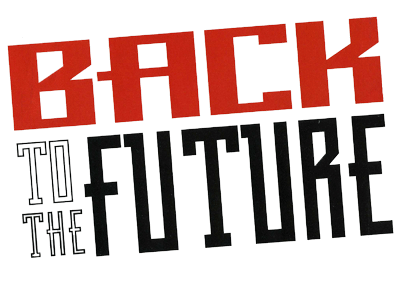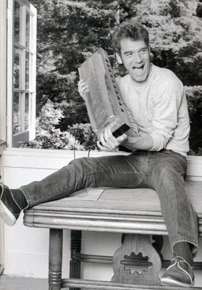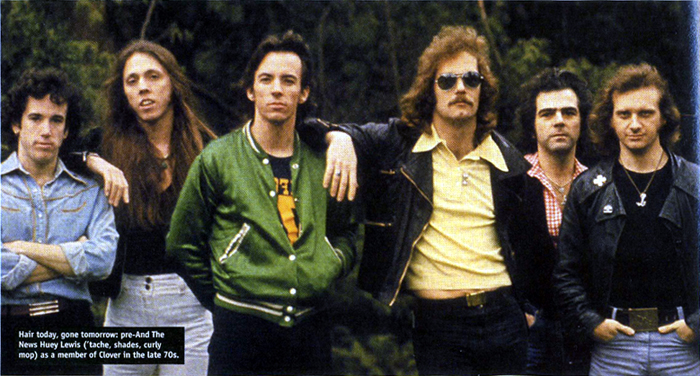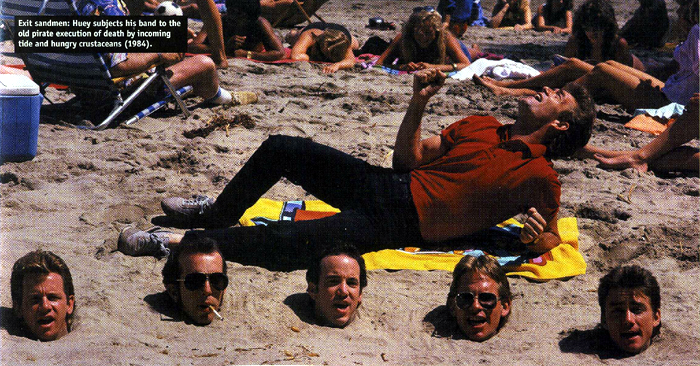

Classic ROCK, #59 November 2003, page 50-57:
 |
 |
In their 23 years Huey Lewis And The News have sold more than 20 million albums and charted around the globe, but claim they are still misunderstood. Classic Rock looks at a band that have become victims of their own success. Hip square: Hugh Fielder
THERE' S A TWINKLE IN HUEY LEWIS'S EYE AS HE contemplates the damage that 20 million album sales have done to his career. "People think we're a pop band," he says, "but we're not a pop band. Never have been. We just had some huge successes that hurt us a little."
Well, it's not so much the multi-million album sales as the dozen consecutive American Top 20 hits that have irrevocably branded Huey Lewis And The News as a pop band. What's more, they shamelessly contrived to get hits.
"True," Huey replies, without a trace of apology, as he tucks into his tuna salad in the atrium restaurant at London's elegant Landmark Hotel. "Hits are a way to make you hot. When you're hot you learn how to play live to become big. So that when you're not hot any more you're still big. And that's the way it's worked for us."
Fair point. But behind the undeniable class of the records, the band's musical credentials and connections or even their kick-ass live shows, the fact remains that at the heart of The Heart Of Rock And Roll' there's a damn drum machine.
"Correct," Huey agrees, without a shred of guilt or remorse. "I knew the drum machine had great possibilities for us. It was this whole thing about new tech versus our bluesy R&B style melding together. It was the old and the new all at once. We had to use it."
| Huey on Bob Dylan "I've got a little place in Montana. We go up there and Bob Dylan's in town. He's touring Montana in March. It's minus nine degrees. He's playing 4,000-seater halls. I'm trying to figure the math; I can't see how he's making any money. I mean, he's got two buses and a big truck out on the road. "A buddy of mine, Ray Benson, from Asleep At The Wheel, is supporting Bob, so I go with Ray to the show and sing a song with him. "Bob shows up, steps off the bus and on to the stage. He plays the show, gets back on the bus and heads straight to the next town. He'll arrive at five in the morning and he'll check into the Best Western because it's the only motel they've got. He'll play at the university there, another 4,000-seater. It just doesn't add up. He doesn't need the money, and he's not making any. Why? Because it's a sanctuary. You can blot everything else out, legitimately. You stay on that bus because you don't want to get off." | But the rest of the band took some convincing. "The drummer was my best friend for life," Huey explains. "I'm going, 'It's not a threat, it's an opportunity'. And I persuaded them to give it a go. We tried it on 'I Want A New Drug' first because we wanted a really precise, sharp beat on it. We set the Linn drum [drum machine] at the tempo we'd been playing it and started to play. And, er... it didn't work. It was just dragging. After two or three shots the band were muttering, 'This is awful. Let's just blow it and play'. "So we blow it off and cut the song without it. And then we cut The Heart Of Rock And Roll', 'Walking On A Thin Line'... the whole of the 'Sports' album -without the drum machine. And then we gave it to Bob Clearmountain to mix. But it just wasn't right, dammit. I made him remix it - and he hates to remix. I'm going, 'What is wrong here? Why can't we get this thing to groove?'. "Just as we're finishing off, our record Company, Chrysalis, closes its US distribution department and signs with CBS. There's redundancies, and nobody knows quite what's going on. So we decide to hold back the record until the smoke clears. I literally put the tapes under my bed in case Chrysalis came looking for them. Because this was a vital record for us and we didn't want to blow it. |
"I worked on the other guys, and they were not happy but I finally convinced them. We went in and set up for 'I Want A New Drug' again and dialled up the Linn machine. Only this time we set it a couple of notches faster. And that made a world of difference. Suddenly it was the most fun thing in the world to play to. We sequenced the bass, overdubbed the cymbals and fills, and it just popped. Then we did 'The Heart Of Rock And Roll' and 'Walking On A Thin Line' and they popped, too."
The irony is that the first hit off 'Sports', 'Heart And Soul', didn't have any drum machine on it. Cynics might argue that it didn't need one, as it was written by Mike Chapman and Nicky Chinn, whose pedigree included Sweet, Suzi Quatro, Mud and Smokie, not to mention Racey. So, no credibility points there either.
"That was my call," Huey admits. "I heard the song and thought, 'That's great. And it's a hit'. It was a hedge-your-bets song, an obvious hit. And we needed one."
'Heart And Soul' served its purpose, in the autumn of 1983 kicking off the hit sequence that ran for nearly five years. It may have looked like an overnight success story, but Huey had been paying close attention for the previous 10 years, and when it came he was ready for it.
Brought up in the 50s in the Bay Area of San Francisco by liberal parents whose house was a regular hang-out for the beat generation ("I'd wake up in the middle of the night and there'd be this raging party going on. I'd wander out into the hallway and Allen Ginsberg would be there, waving his finger cymbals"), Hugh Anthony Cregg III was academically bright. He was set to study electrical engineering at College, before his father sent him bumming around Europe for six months - they didn't have gap years back then.
Somewhere in Europe he took up the harmonica, and by the time he'd reached London's Marble Arch underpass he could earn a crust from busking. By the time he got back to America his outlook had changed. By the beginning of the 70s he'd quit College and was back in the Bay Area, playing with various bluegrass bands before joining a country rock band called Clover - who would later comprise the nucleus of Huey's band The News.

"One night in 76 we're playing the Palamino Club in LA," Huey recounts, "when in walks Nick Lowe, Jake Riviera and four guys in suits - Dr Feelgood. They've been playing a CBS convention, and Nick has come over as Wilko Johnson's guitar roadie. He lands up sitting in with us, and when we ask what song he wants to play he picks an old one we can barely remember and plays it perfectly. Even sings it. It blew my mind."
Lowe and Riviera convinced Clover that the future was bright in Blighty, and a plan was hatched. But even as the group touched down at Heathrow, the first tremors of punk were being felt in the UK. "The week we arrived I went to see the Clash at the Roundhouse, and the audience are gobbing on them and Joe Strummer is covered in spit, and I'm like, 'What is going on here?!'." Huey recalls.
The tremors weren't yet strong enough to prevent Clover from getting a record deal with Phonogram, but while they were making their album their hosts were busy setting up Stiff Records, and the pub rock scene was changing beyond recognition. Still, at least they had a grandstand view of it all. And they also got their album produced by some obscure Phonogram house producer called Robert 'Mutt' Lange.
|
"He's an incredible producer. But it's his vision," Huey says. "We just weren't mouldable enough. He literally came in and arranged everything. It just didn't work. And those records don't hold up." CLOVER EVENTUALLY RETREATED BACK TO THE STATES. BUT THE memory of watching Dave Edmunds and his band Rockpile playing raunchy rock'n'roll with unabashed gusto lingered with Huey. "I saw them playing just what they wanted and trying to make it as good as possible, and I figured, 'If they can do that, I can do that'." He formed a band called American Express, and once again built up a reputation on the West Coast before the Brits intervened again, this time in the form of Chrysalis who were happy to take a punt on the group, provided they changed their name. Their first album, 'Huey Lewis And The News', in 1980, was smart power pop with a cool soulful swing and neat songs like 'Trouble In Paradise' (later exhumed for the 'We Are The World' US Live Aid album) and 'Some Of My Lies Are True'. "Yeah, they're cute but they're not dumb," Huey reflects. "The album got some good reviews which basically said, 'These guys are serious', and we went out and toured. But it sold not at all." Huey realised they'd need a hit off their second album, "or Chrysalis would let us go and it would all be over. So we were going to have to make some hard commercial choices. And I wanted to make those choices myself. What I saw then was maybe having to compromise ourselves or find a radio-friendly hit. And l wanted to be the one to make those choices, because I knew I was going to have to live with it."
| Huey on Phil Lynott "Thin Lizzy were amazing. I'd never seen anything like them before. They were a window into that big hard rock thing. "I supported them with Clover on their 'Live And Dangerous' tour. It was all we could do to keep from getting booed off. If we got through ten songs it was a good night. "But every night Phil was at the side of the stage, and afterwards he'd come up with all these suggestions like, 'You should be starting with your third song because it's a much better opener'. And he was the first one who said, 'That song you sing, you should do more of those'. "I did some recording with him just before he died, but it's never come out. When it came to the vocals, I thought he'd become far too lazy. I wanted him back up in his full range again. I'd cut the songs in keys that I knew were up there for him, but he hadn't sung that way for a few years. So it was tough going - line by line sometimes. I'd be going. 'That's not good enough. We need to do that again'. I wasn't afraid of him. "We never really got the vocals finished when we ran out of time. He was going to go back and work on it some more, but that's when he died. Which was a real shame." |
That meant they were going to have to produce it themselves. Eventually Chrysalis relented. "No big American label would have let us do that," Huey says. "And that was when we learnt how to make our own records; in fact records in general. My original theory was that if we did a maximum of three takes -just go in and play it as fast as we could - then we'd sound live. What I failed to realise is that it's not live, it's tape. If you want tape to sound live you have to spend time making it live."
The key turned out to be a song by their old mate 'Mutt' Lange called 'Do You Believe In Love', which was Huey Lewis And The News's Top 10 breakthrough in the States. "We all knew it was a radio-type tune," Huey says. "The only question was, could we make it live for us? Because it was very pop - poppier than we'd ever been. But we changed it around and it worked out."
The stakes were higher for the 'Sports' album, but the band were primed and, once they'd learned to love the drum machine, the hits rolled in - five of them off a nine-track album. "I knew we had four or five really good songs," Huey says. "In fact, 'Sports' is only about half a dozen songs deep. And then it just falls apart."

Along with the charm came the zeitgeist. Huey found himself in a room with Steven Spielberg and associates talking about their movie Back To The Future. "They're telling me about this Marty McFly character [played by Michael J. Fox.], whose favourite band would be Huey Lewis And the News. So would we write some songs for the movie? I said, 'We don't know how to write songs for movies but we'll send you the next thing we write'. Which was 'The Power Of Love'."
The song was an international hit and their first US No.1. Which just intensified the pressure on the next album, 'FORE'. "Yeah, we felt it," Huey admits. "It got the point where we'd worry about every note; I didn't want to leave one bad moment on the tape. We produced that one tits-out."
Pressure turned to panic when Bob Clearmountain was kidnapped by Bruce Springsteen to help build his 'Tunnel Of Love'. Huey and his News ended up mixing 'FORE' by themselves. In doing so they may well have "made a lot of mistakes; some of the drum echoes were so big". Nevertheless, 'FORE' yielded another couple of No.1s and three more Top 10 singles.
IT SEEMED THEY JUST COULDN'T STOP WRITING HITS. "IT WAS ONE of those things where you open the door a little bit and, whammo! After years of A&R guys going, 'I dunno, I'm not sure that's a hit', eventually we start getting hits, and all of a sudden every little ditty we come up with the A&R guy's going, That's a smash!'. And I'm thinking, 'This can't be right'."
And while Huey and The News were perfectly capable of writing 'Hip To Be Square' (too hip for many Americans who didn't get the irony) and 'Stuck With You' themselves, they had no hesitation in using outside songwriters, such as Bruce Hornsby who wrote 'Jacob's Ladder'.
'Small World", in 1988, was a deliberate shift in direction. But it got slammed by the critics for the band having moved away from their roots.
"That hurt," Huey admits. "But it wised me up to a lot of stuff. It was probably good that it happened. What annoyed me was that it was absolutely our best work to date. We were getting better musically all the time; we got the mixes right - the way they should have been done on 'Fore' - and it sounds great. A lot of people reckon 'Small World' is their favourite album."
'Small World' remains arguably Huey Lewis And The News's best album, even if it doesn't contain their best songs. Mind you, 'Perfect World' notched up another top-three hit before the title track broke the sequence, failing to make the Top 20 and trailing the news that the band was no longer hot, just big.
| Huey on Record Company Economics "A band signs a record contract. They make a record. It sells five million copies. Now the manager says, 'I want a new record contract'. And the company says, 'What do you mean? You've only just signed one'. And the manager says, 'We're not making a new record until we get a new contract'. "So they renegotiate. You figure that the record will ship one million copies on the day of release. At sixteen dollars per CD, that's sixteen million dollars gross. So what you want is two million dollars to make your record. And they go, 'Okay'. "You spend a year in the studio. Even with the best food and stuff you're still only spending around 6-700,00 dollars. And then you hand it in. "Now the record company can do one of two things. They can say, 'It's fabulous' and release it. Or they can say, 'It's great, but it can be a little bit better'. That way they don't have to write the cheque yet. As soon as they say they love it they have to write the cheque for $1.3 million or whatever the balance is. So they'll go, 'It's great, but I think we need a rock single or a ballad'; and, 'Why don't you do it in Montserrat?' or wherever. 'We'll pay for it.' They're not really paying for it, of course, you are, because it's going to come out of your royalties. "That's why the records take so long - the money's there and the record company is spending your money. They're hedging their bets. And why not?" |
But they were kind of prepared for that too. It was part of the momentum thing.
"In fact that was more evident on our next album, 'Hard At Play', which was on its way to becoming a great record. The idea was to go back to basics. And I'd written four really good rock'n'roll songs. We did rough mixes, and the record Company heard them and said, 'We're not sure'. And by now it's the nineties and I've got my family and I'm not as invested. I'm more indecisive. I let them talk me into a producer. And the album is a hotchpotch." But it wasn't just Huey who was being indecisive. "The record company kept saying, 'You gotta rock'. So I said, 'How about 'Couple Days Off? Does that rock hard enough for you?' And they went, 'Oh, yeah'. So what happened? Real rock stations wouldn't play it because we were Huey Lewis And The News. So now we had image problems at the radio stations." Even so, 'Couple Days Off' only just missed the Top 10 in 1991. But by now Huey Lewis was concentrating on making good albums rather than hit singles. Dealing with A&R guys was bad enough, but phone research was another matter. "They phone you up and play 30 seconds of a song down the line and then get your reactions. And then they tell you it's testing positive with this or that demographic. That's why the whole thing is such bad shape. Because we all know that the best stuff you don't get first or second time around. These days the only stuff that gets played sounds like something you already know." So how did Huey record his latest album, 'Plan B'? "It's a take. I do it with all five guys. And when we're done I say, 'Anybody got a fix? I'll punch you in and out and you can fix it'. I might let them fix two, but three or more and we all go back in and cut it again." |
The drum machine served its purpose. But it isn't needed now.
| © 1996-2015 Clover-Infopage.com |